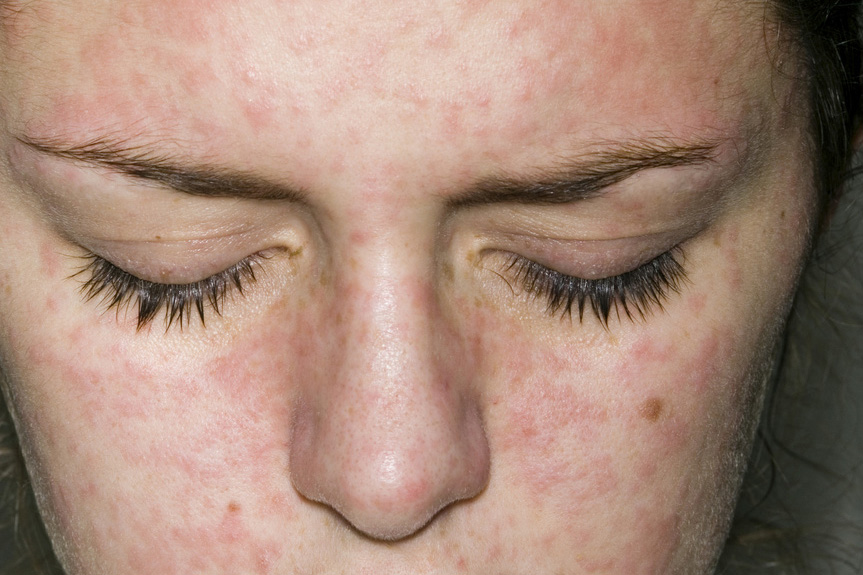
Global concern over measles is rising. Should Switzerland worry?

Measles, a disease once close to eradication, is making a global comeback, with major outbreaks in the US and spikes across Europe. In Switzerland, a crisis is unlikely – but health authorities warn maintaining strong vaccination rates is crucial.
Measles should be a disease of the past. It is one of the most contagious viral infections known to humans. It is also easily preventable through a safe and highly effective vaccine.
The disease was on track to being eradicated worldwide. Between 2000 and 2022, global vaccination efforts prevented an estimated 57 million deathsExternal link, and by 2023, 82 countriesExternal link had succeeded in eliminating the virus.
This trajectory has since been thrown off course. In the European Economic Area (EEA) – including all EU member states and Iceland, Liechtenstein, and Norway – reported casesExternal link rose almost tenfold in 2024 compared to the previous year.
Across the broader European region as outlined by the World Health Organization (WHO), measles cases External linkin 2024 reached the highest level in 25 years. Globally, more than 107,000 people – most of them young children – died of the disease in 2023External link.
More recently, the resurgence made headlines worldwide in February 2025, when an outbreak in Texas led to the first measles-related deaths in the USExternal link in 10 years.
Measles is extremely contagious – nine out of ten susceptible people (those who are unvaccinated or not immune) will become infected if exposed to the virus. Because of this, the threshold for herd immunity – the level of population-wide vaccination needed to prevent outbreaks – is particularly high. According to the WHO, 95% of people need to be vaccinated with two doses of the measles-mumps-rubella (MMR) vaccine to effectively protect a community, including those who cannot receive the vaccine themselves.
While measles is sometimes dismissed as a harmless childhood illness, it can cause serious complications, particularly in young children and people with weakened immune systems. These include pneumonia, encephalitis (brain inflammation), long-term disabilities, and, in rare cases, even death. “The vaccination prevents severe complications and deaths from measles in practically 100% of cases,” wrote a spokesperson for the Swiss Federal Office of Public Health (FOPH) in an email to SWI swissinfo.ch. “It protects against 95-98% of cases of measles, which then manifests itself – if at all – in a very mild form without complications.”
Reasons behind the trend are many but one of the main causes is a growing vaccine hesitancy among parents and a drop of vaccinations of children during the Covid-19 pandemic.
“Measles is back, and it’s a wake-up call. Without high vaccination rates, there is no health security,” warnedExternal link Hans P. Kluge, a doctor and WHO Regional Director for Europe, in March.
Measles doesn’t just make people sick – it can also weaken their immune system for months or even years after recovery, as the virus causes “immune amnesia”External link, making the body “forget” previously acquired immunity, both from past infections and vaccinations. This leaves individuals more vulnerable to diseases they were once protected against.
A mixed European picture
Measles is resurging across Europe, but the situation varies widely from country to country. According to the European Centre for Disease Prevention and Control (ECDC), 32,212 measles cases were reported in 2024 across the EEA – a dramatic jump from the 3,973 cases in 2023.
But the surge was largely driven by a major outbreak in Romania, which alone reported 27,321 cases. Austria, Belgium, Ireland and Italy have also experienced significant increasesExternal link and high incidence rates, while most of the Scandinavian countries have reported only minor changes and a low number of cases.
Switzerland is ‘well protected’
In Switzerland, the number of measles cases has remained mostly stable, with a few local outbreaks but no indication of a resurgence – defined as a sustained increase in cases over previous years or the emergence of multiple local outbreaks.
Case numbers in 2024 and so far in 2025 remain within the range observed over the past decade, well below the 2019 spike and significantly lower than earlier peaks in 2009 (1,112 cases) and 2011 (678 cases).
However, health authorities and experts emphasise that continued vigilance and high vaccination coverage are essential to maintaining this stability.
“The Swiss population is now well protected against measles,” wrote a FOPH spokesperson in an email to SWI. “Nevertheless, isolated cases and limited outbreaks may still occur. These are often sporadic cases where the infection has been contracted abroad, or small outbreaks due to one imported case.”
This is what happened in early 2024, when an unvaccinated individual returning from abroad sparked an outbreak in the canton of VaudExternal link. The virus spread primarily through a university campus, resulting in 51 confirmed cases. No hospitalisations or complications were reported, but the outbreak prompted temporary campus closures and highlighted how quickly the disease can circulate.
A small outbreak in Zurich schools was also reported in early 2025, and across the canton, ten confirmed measles cases and four suspected ones were recorded in the first four months of the year – up from just four cases during the same period in 2024.
Health authorities attributedExternal link the cluster to immunity gaps. Hospitals and general practitioners were asked to check vaccination records and stay alert. They are “well prepared, know how to recognise measles early, and what steps to take in the event of a suspected case”, said a spokesperson from the Zurich Department of Health in an email to SWI.
An avoidable crisis
Swiss measles numbers remain low, especially in contrast to the severe outbreak unfolding in the US. Since January, over 900 cases have been reported in western Texas, with 93 hospitalisations and two deaths among unvaccinated children. The outbreak has raised serious concerns about the US potentially losing its measles elimination status, which it achieved in 2000. Switzerland, by comparison, was declared measles-free by the WHO in 2019.
The Texas outbreak began in Gaines County, where vaccination rates have declined sharply – particularly among the local Mennonite community. While not opposed to vaccines, some Mennonite groups avoid modern healthcare and maintain traditional practices, leading to low immunisation rates. In the district with the lowest coverage, MMR vaccination among kindergarteners dropped from 82% in 2019 to just 46% in 2023.
The crisis isn’t confined to the US. In neighboring Mexico, over 500 measles cases and one death have been confirmed in 2025 alone, a stark rise from just seven cases in all of 2024.
Shaky coverage
Groups that are opposed to vaccines on religious or ideologically grounds account for only a small fraction of the population, and alone are not sufficient to explain why many countries struggle to get to the 95% coverage threshold required for measles herd immunity.
In most cases, parents express hesitancy – for example, raising concerns or delaying appointments – rather than outright refusal. This should not come as a surprise, says Heidi Larson, founder and director of the Vaccine Confidence Project, and Professor of Anthropology, Risk and Decision Science at the London School of Hygiene & Tropical Medicine. “Nowadays mothers and fathers are bombarded with all sorts of information from all sort of sources – it’s really difficult to navigate it all.”
Between 2020 and 2023, 16 out of the 30 EEA countries reported a decreaseExternal link in measles vaccine coverage for at least one dose, with declines more pronounced for the second one. In Switzerland coverage is still highExternal link: 95% for the first dose, recommended at nine months of age, and 91% for the second dose, recommended at twelve months. Regional disparities exist in the country.
“French- and Italian-speaking cantons tend to have higher vaccine coverage across the board, not just for measles,” says Michael Deml, researcher at the Infectious Diseases Department of the Kantonsspital Baselland.
Information overload
One reason why vaccine coverage has faltered in some countries is the disruption to healthcare services during the Covid-19 pandemic. “Some parents delayed or skipped vaccinations, either because visiting healthcare facilities seemed too risky at the time, or because services were outright suspended,” says Larson.
In rare cases, the issue is supply. Since last year, Japan has been experiencing a shortage of the MR (measles-rubella) vaccine due to manufacturing problems, leaving some people – especially children – unable to get vaccinated. But in most high-income countries, access to vaccines is not the main obstacle.
The reasons for not vaccinating are highly individual and depend on a wide variety of factors, but according to Deml they can be grouped across clusters of concerns: is the vaccine safe? Is it effective? Is it necessary? Some parents also worry that too many vaccines are given to young children over a short period, he adds.
About one in five unvaccinated people who contract measles require hospitalisation. The most common complications include pneumonia – the leading cause of death from measles in young children – ear infections, diarrhoea, hepatitis, and encephalitis (swelling of the brain). Some of the complications can in turn lead to long-term disabilities such as deafness or intellectual impairment.
A particularly rare but fatal complication is subacute sclerosing panencephalitis (SSPE), a progressive brain disorder that typically appears years after infection and mostly affects children who had measles before the age of two. Overall, between one and three in every 1,000 measles infections result in death, and the risk is especially high among unvaccinated individuals, children under five and those with compromised immune systems.
In some cases, a single publication can cause long-lasting harm. A clear example is the infamous 1998 paper published in The Lancet, which falsely linked the MMR vaccine to autism. Though the article was later fully debunked, withdrawn by the journal, and the lead author lost his medical license, the damage was already done.
“The article had such a profound impact that it took nearly 20 years for immunisation rates in the UK to recover,” says Deml. And despite overwhelming scientific consensus showing no link between vaccines and autism, the rumour continues to resurface.
But “it’s not fair to accuse people of wanting to hurt their kids”, warns Larson. “Parents just want to do what they think is best for their children, but sometimes it’s just not so easy to understand what that is.”
“The measles virus never rests – and neither can we,” notedExternal link Kluge.
Edited by Virginie Mangin/ds

In compliance with the JTI standards
More: SWI swissinfo.ch certified by the Journalism Trust Initiative






























You can find an overview of ongoing debates with our journalists here . Please join us!
If you want to start a conversation about a topic raised in this article or want to report factual errors, email us at english@swissinfo.ch.